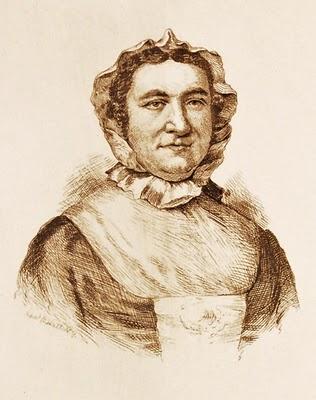Women of the NYSL: Polly Spratt Provoost Alexander
Was a woman responsible for the founding of the New York Society Library?
According to Mrs. John King Van Rensselaer in The Goede Vrouw of Mana-ha-ta: At Home and in Society 1609-1760, the answer seems to be yes. Van Rensselaer used what scanty family records and papers existed of women’s lives during the colonial period to write her book about the good women of Manhattan, “placing her in the foreground, with the men of the day in shadow as her background, thereby throwing her into strong relief, instead of (as is usually done) reversing the process.”
One of her subjects, Mary (“Polly”) Spratt Provoost Alexander (1693-1760), was a great success as a merchant and businesswoman and a host of great renown in the colony. Van Rensselaer wrote that Alexander’s “house naturally became the centre of hospitality, and her parlors in the evenings were always sure to be filled with all the gayest and brightest people in the city; but politics was eschewed at these gatherings, which were devoted to the discussion of the latest news of the literary world and the newest books, just dashed with a little tittle-tattle about the island and its inhabitants.”
At one of these evening salons, Alexander purportedly proposed that a circulating library should be started because she was having difficulty procuring good books to read. What is certain is that one of the men at the gathering was William Smith Jr., who mentions in his book The History of the Province of New-York (Volume Two covers the years 1732 -1762, which was published from his manuscript after his death) that “In the month of March 1754, nearly 600 pounds was raised towards promoting a spirit of enquiry among the people by a loan of books to non-subscribers. The project was started at an evening convention of a few private friends: Messrs. Philip Livingston, William Alexander (afterwards known by the title of the Earl of Stirling), Robert R. Livingston, William Livingston, John Morin Scott, and the author.” In Smith's recounting of the origins of the New York Society Library, no mention is made of William Alexander’s mother Polly, but should we be surprised?
My curiosity about Polly Alexander, lost in the archives and to the Library’s history, was piqued. As is easy to do, I plunged headfirst down the rabbit-hole into our fabulous book stacks.
Alexander’s first husband, Samuel Provoost, was a merchant, who left her widowed at age 26 with three children. She took over her husband’s business, and proved a shrewd businessperson in her own right, greatly increasing her fortune. As proof of her business savvy, Alexander is also credited with laying the first sidewalk in the city in front of her property on Broad Street. At the time, the entire street was cobblestone, which prevented horses and carts from getting stuck in the muck, but making it very difficult to walk. Alexander set to laying large flat stones all along the street in front of her business and to the corner to provide those on foot with a smooth surface to walk on to get to her store. Her pavement was apparently the “talk of the town, and such a convenient innovation attracted many visitors.”
A few years later, she married again, to James Alexander, a lawyer and politician, and descendant of the Scottish Earls of Stirling. With James, she had seven more children, though only five reached adulthood. While also apparently actively supporting her husband’s career, she continued to run her profitable mercantile business and it was noted that “hardly a ship docked in New York without a consignment for her.” Her son William went into business with his mother; his correspondence reveals an ugly side of the business, connected to the sale of enslaved people from the West Indies. William, a guest at the salon where her idea of a city library was proposed, became one of the founders and original trustees of the New York Society Library.
Alexander died in 1760, and our surviving charging ledgers begin in 1789, so unfortunately, we have no record of whether the Library did provide her with the good books she desired in her last years or whether she even had a subscription to the Library in her own name. But I like to think she did, as our 1772 charter does include the name of one woman (Anne Waddell) and our earliest charging ledgers reflect the circulating records of at least 57 women readers, unusual for the day and age, but not, apparently, at the New York Society Library.
For more Women's History Month reading, my 2020 post on notable women members marking important Library firsts, is here. And our Acquisitions Department has collected a list of recent acquisitions focusing on women's vast contributions to history and culture.


Disqus Comments